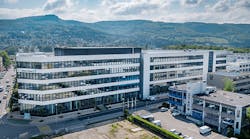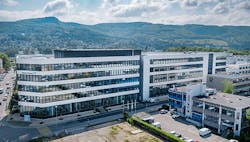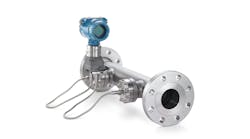Endress+Hauser continues on the path to growth. During the past five years the number of employees at its Reinach location in the Swiss canton of Basel-Landschaft has grown by 20% to more than 2,000. At the same time, the number of units produced has increased and the digital solutions portfolio has expanded. In order to simultaneously meet the new demands of the work environment, vocational training positions and digitalization, the company invested $62.45 million in the Reinach campus.
After beginning work on the foundations in 2019, Endress+Hauser celebrated the opening of the nearly 150-meter-long building in Reinach on July 1. The construction plan included the use of available property and an existing building located on Kägenstrasse. The new facility, which boasts more than 25,000 square meters of space, was built with roughly 19,000 cubic meters of concrete and 2,200 tons of reinforced steel and other materials.
The new building is home to Endress+Hauser Flow, the product center for flow measuring technology, as well as Endress+Hauser Digital Solutions, which is responsible within the Group for all issues related to digital communication and automation solutions. The first wave of employees has already moved into the facility.
As a result of the expansion, approximately 1,050 employees will move across all buildings. The additional space will create more collectively used workspace.
“In the spirit of ‘New Work’, we are implementing activity-based working. Different work areas will be available for different activities, meaning that our employees can choose the space best suited to their individual tasks,” says Mirko Lehmann, managing director of Endress+Hauser Flow.
Special coworking zones, such as Innovation Labs or project zones, offer different departments the opportunity to collaborate on longer-term projects. Employees can choose between a permanent or shared desks. Bright, friendly spaces and a modern infrastructure have a positive impact on the work environment as well.
The new building also brings training and education into the heart of operation, offering areas conducive to learning with workshops, labs and training rooms, which can allow the company to increase the number of apprenticeship positions and vocational careers. To date, 43 apprentices have been trained in eight areas. Beginning in August, nearly 50 apprentices will be trained in 11 vocations. This number is expected to grow over the next five years.
The company expects around 4,000 annual visitors to the new plant tour and hospitality concept. This concept consists of a redesigned reception area and a new visitor center including “Flow Experience,” an integrated 2,000-square-meter area where the Endress+Hauser brand and flow instrument portfolio can be experienced before taking a tour of the plant.
Furthermore, Endress+Hauser is using the new building to align its ongoing business growth with its ecological and social responsibilities. In light of the goal of the Endress+Hauser Flow sustainability strategy to operate its buildings in Reinach in a CO2-neutral manner by the year 2030, high value is being placed on climate-friendly facilities management. As part of the energy concept, for example, waste heat is stored in a stratified storage tank for warm water and then used for heating. A comprehensive energy monitoring system using instruments from the company’s own portfolio also helps to continuously optimize operation of the buildings.
Large photovoltaic systems were installed on the roof of the new building, which boast a peak capacity of 365 kilowatts, enough to cover the annual electricity needs of around 75 single-family homes. In Reinach, Endress+Hauser now has photovoltaic systems covering more than 3,700 square meters with a total peak capacity of roughly 1 megawatt, making the company one of the largest solar power producers in the Basel region. The roof is also home to two bee colonies and various bee-friendly flowers, a project that contributes to the preservation of biodiversity as these small insects are considered central Europe’s most important plant pollinators.




